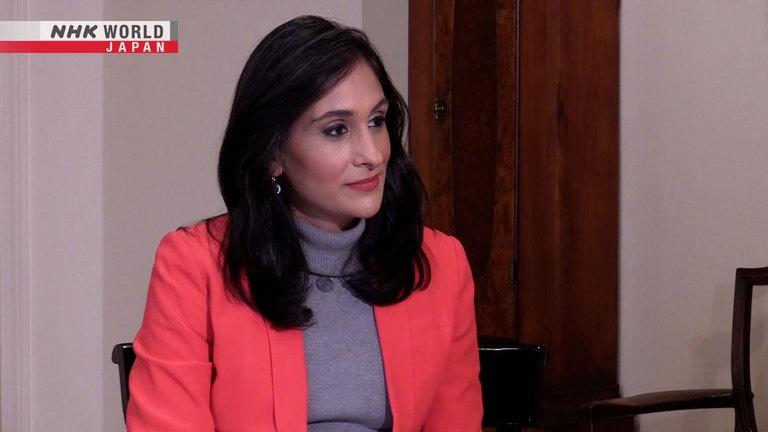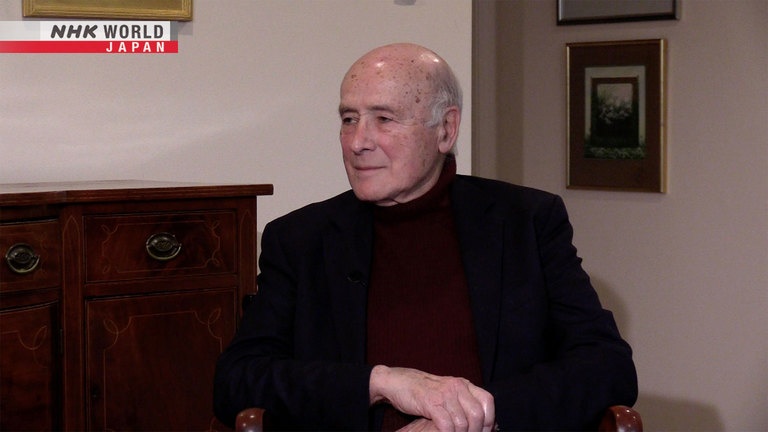US Leadership in the Changing World: Joseph Nye / Emeritus Professor, Kennedy School of Government, Harvard University
Rising tensions in multiple regions now challenge the world. Conflicts in the Middle East and Ukraine continue to complicate the geopolitical landscape. What are the implications of these conflicts for the US and its allies? What does this mean for the future of global order and US leadership? Joseph Nye, Emeritus Professor and former Dean of Harvard's Kennedy School of Government, discusses these issues.

Del Irani
DEEPER LOOK Host

Joseph Nye
Emeritus Professor, Kennedy School of Government, Harvard University
Transcript
Hello and welcome to DEEPER LOOK, coming to you from Cambridge, Massachusetts near Boston.
I'm Del Irani, it's great to have your company.
We're here this week because in just a moment,
we're going to meet one of the influential scholars on American foreign policy.
The world is now challenged by rising tensions in multiple regions.
The conflict between Israel and Hamas has been spreading throughout the Middle East,
while the ongoing conflict between Russia and Ukraine continues, complicating the geopolitical picture.
So, what exactly are the implications of these conflicts for the US and its allies?
And what does all of these mean for the future of the global order?
Well, these are just some of the questions I'm going to put to Joseph Nye.
He's an emeritus professor and former Dean of Harvard's Kennedy School of Government.
Dr. Nye was also a US assistant secretary of defense under the Clinton administration.
Dr. Nye, welcome to the program.
Thank you. It's good to be with you.
How do you evaluate the US response to the recent global developments,
such as what we're seeing happening in the Middle East and of course, the Russia-Ukraine conflict?
Well, we've seen a something of a sea of change in international politics since Vladimir Putin invaded Ukraine two years ago now.
And then you have since October, the Hamas attack on Israel and Israel's response.
I would argue that the Biden administration has done a pretty reasonable job.
I think defending Ukraine against the Russian invasion was important. Is important.
And on the war in Gaza, I think basically the Biden administration has been supportive of Israel.
But trying to moderate the Israeli reply and to push toward a longer-term solution
in which there will be a promise of a Palestinian state.
I think these are the right directions to go.
One could always disagree on any of the details.
Right. Well, a lot of countries do disagree on some of the details.
A number of countries are not aligned with the US in these conflicts.
How is that affecting the US's leadership role in the world?
I do worry about the Gaza war.
I think the Israelis have a right to defend themselves.
They did suffer a massive atrocity on October 7th in terms of the killing of civilians, women, children and so forth.
On the other hand, I think that the response has been disproportionate
in terms of the number of Palestinian civilians that have been killed.
There have been costs to the American reputation and soft power
because of the disproportionate response in terms of killing of civilians.
But if somehow, it's possible to get a picture of a long-term solution which will stabilize the region,
then some of the current criticism may subside somewhat.
You have a recent book that's called "A Life in the American Century."
And the American Century, is basically if you viewed the past eight decades,
we've lived during this period of where the US has enjoyed unrivaled power,
whether it's political, economic, military on a global stage.
Tell me from your personal experience,
what are some of the crucial turning points in this American century that you've witnessed?
Well, looking back,
I think probably one of the most important periods that I describe in a whole chapter was the 1960s.
It starts out with respect for law and order and the American preeminence.
It ends with riots in American cities, disruption of universities.
A bomb went off in my building at Harvard, for example.
And people marching through the streets around the world against American opposition to Vietnam.
So, it's quite a change over a decade.
And I think what's always intrigued me is that while people were deeply opposed to the Vietnam War,
to the American position in Vietnam, that the Americans were able to recover from it.
So, that by the eighties, for example,
many of these protests against the United States were no longer there.
How did America turn that around? What was the turning point?
Well, I think one of the things that turned it around was we eventually got out of Vietnam.
But I think also the fact that America was a free society in which that people overseas,
could see Americans protesting the war helped.
When Ronald Reagan comes in to the presidency, he's something of a cheerleader,
and is placing a strong emphasis on freedom in America, calls the Soviet Union an evil empire.
And in the process of the decade that followed Vietnam,
you get a change in American policy and a change in international perceptions of the United States.
How do you assess the US position of global leadership today?
Is the US still poised to be a global leader given the challenges?
Well, it's hard to see any other country that's better positioned, or as well positioned as the US.
I mean, the US is still a quarter of the world's economy.
It's basically energy independent.
The dollar is the only major reserve currency.
So, the US is basically larger today, even if it's not as dominant as it was in 1945.
And if the largest country doesn't produce global public goods, they won't be produced.
So, I think the US is positioned to lead, but sometimes our domestic politics gets in the way.
I mean, a good example of this is the leadership you had under Obama on climate change
and the fact then that that was followed by Trump pulling the Americans out of the Paris climate accord.
How do you think the outcome of the US presidential election will influence the US's leadership role in the world?
Ex-president Trump is a very unpredictable personality,
and so we don't know for certain what he will do.
But if he were to follow up on ideas that have been suggested by those around him,
such as pulling the United States out of NATO or reducing our alliances,
putting up 10% tariffs or high tariffs on all foreign trade, pulling out of the Paris climate accord.
This would have a very negative effect on American power or the world.
It would, I think, be very costly to us.
It still wouldn't deprive the US of those assets that I mentioned.
Its location, its economic preeminence, its military preeminence.
But it would certainly damage the American soft power.
Now, the question is, can we survive four years of that? And my hunch is probably yes.
Just as we survived the bad periods of the sixties.
But it's not going to be very pleasant.
If President Biden is reelected, I think you can see more of the same.
In other words, the trajectory that you'll have is the same.
And when Biden replaced Trump in 2021, it was a reaffirmation of alliances and of international institutions.
And I would think the Biden approach will remain the same.
One of the terms you've coined that we've used in this interview so far is, of course, soft power.
It's a well-known phrase, but basically,
it's the ability to get what you want through attraction instead of coercion or payment.
How much longer do you think America can hold on or retain its soft power?
Well, I think that taking the examples I gave of what I've seen over my life,
the American soft power goes up and down.
And went down after Vietnam, went back up again the Reagan period and the Clinton period.
Went down again after the invasion of Iraq during Bush 43.
Went back up again when Obama was elected, goes down again under Trump.
So, I think it's ups and downs.
- There's a long history of..
- Where is it now?
Well, I think Biden, if you look at the Pew polls,
which are reputable international polls asking countries or people in countries what they find attractive,
which countries they find attractive.
It's interesting that the Americans have more soft power than our major competitors, Russia, China and so forth.
The Americans are better placed.
I think the Americans, because of their preeminent position after World War II,
were better placed to have all sorts of power, both hard and soft.
Let's talk about China.
In 2007, the Chinese government under Hu Jintao,
they declared soft power a national objective.
And I understand that you were invited to a private dinner with the then Chinese foreign minister.
And in that meeting, he asked you for advice on how China can increase its soft power.
Tell us about that dinner. What was it like and what advice did you give them?
Basically, what I told the Chinese was that they had two obstacles to their plan to develop soft power.
One is the number of conflicts they have with their neighbors.
It's very hard to set up a Confucius Institute in New Delhi and be attractive to Indians
if your soldiers are killing Indian soldiers on the Himalayan border.
And China's conflicts with a number of neighbors.
But the other, which is I think equally important, is their insistence on tight party control with everything.
If you look at American or Japanese soft power,
a lot of it comes from civil society, not from government.
For example, in the US case, the attraction of Hollywood or Harvard or the big foundations and so forth.
If you insist on tight political party control of all films, of all broadcasts,
of any innovation in civil rights or human rights, it's not attractive to others.
I tried to give them an honest answer, but I think from their point of view, it was a useless answer.
What would your advice be right now for American leaders in the US
about how they can retain their position as a global leader?
Likely, the American position on soft power comes from our domestic civil society.
So, keeping freedom and democracy at home is crucial.
And it also comes from taking positions abroad in our foreign policy,
which are in the interests of other countries as well as ourselves.
And that's why issues like climate change or international financial stability, or development assistance are so important.
So, if we can maintain democracy and human rights at home,
and if we can have a foreign policy which helps others,
and that could be in the context of our alliances or just helping others who need help.
I think those are the things that stand us in good stead.
- Thank you so much for joining us on the program.
- Thank you.
America has remained a defining power in the global security order
and its influence in the Indo-Pacific region has been pivotal.
Join us next time as we continue our conversation with Joseph Nye,
to discuss the US-Japan Alliance in the era of China's rising influence.
I'm Del Irani, thanks for your company.
I'll see you next time on DEEPER LOOK.